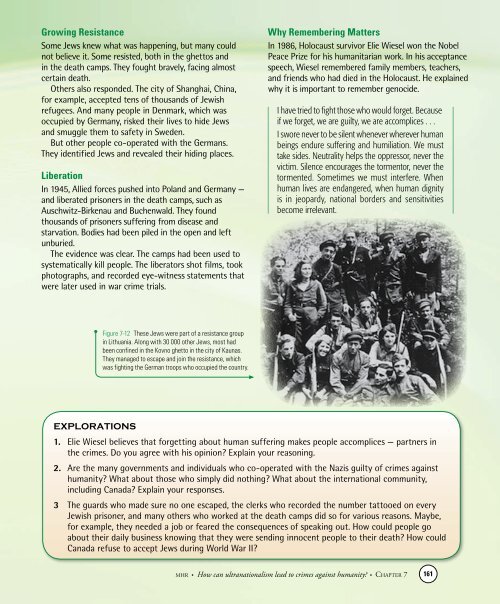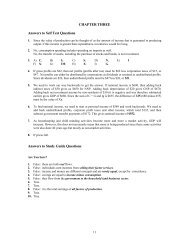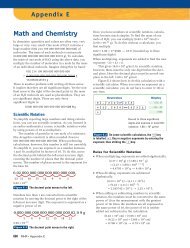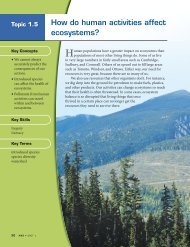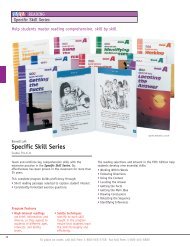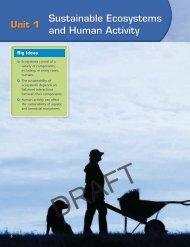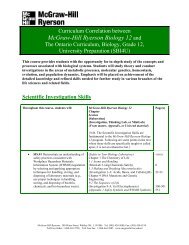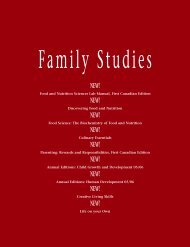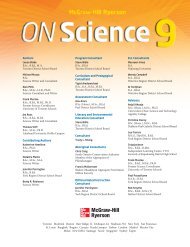Ultranationalism and Crimes against Humanity - McGraw-Hill Ryerson
Ultranationalism and Crimes against Humanity - McGraw-Hill Ryerson
Ultranationalism and Crimes against Humanity - McGraw-Hill Ryerson
Create successful ePaper yourself
Turn your PDF publications into a flip-book with our unique Google optimized e-Paper software.
Growing Resistance<br />
Some Jews knew what was happening, but many could<br />
not believe it. Some resisted, both in the ghettos <strong>and</strong><br />
in the death camps. They fought bravely, facing almost<br />
certain death.<br />
Others also responded. The city of Shanghai, China,<br />
for example, accepted tens of thous<strong>and</strong>s of Jewish<br />
refugees. And many people in Denmark, which was<br />
occupied by Germany, risked their lives to hide Jews<br />
<strong>and</strong> smuggle them to safety in Sweden.<br />
But other people co-operated with the Germans.<br />
They identified Jews <strong>and</strong> revealed their hiding places.<br />
Liberation<br />
In 1945, Allied forces pushed into Pol<strong>and</strong> <strong>and</strong> Germany —<br />
<strong>and</strong> liberated prisoners in the death camps, such as<br />
Auschwitz-Birkenau <strong>and</strong> Buchenwald. They found<br />
thous<strong>and</strong>s of prisoners suffering from disease <strong>and</strong><br />
starvation. Bodies had been piled in the open <strong>and</strong> left<br />
unburied.<br />
The evidence was clear. The camps had been used to<br />
systematically kill people. The liberators shot films, took<br />
photographs, <strong>and</strong> recorded eye-witness statements that<br />
were later used in war crime trials.<br />
Explorations<br />
Figure 7-12 These Jews were part of a resistance group<br />
in Lithuania. Along with 30 000 other Jews, most had<br />
been confined in the Kovno ghetto in the city of Kaunas.<br />
They managed to escape <strong>and</strong> join the resistance, which<br />
was fighting the German troops who occupied the country.<br />
Why Remembering Matters<br />
In 1986, Holocaust survivor Elie Wiesel won the Nobel<br />
Peace Prize for his humanitarian work. In his acceptance<br />
speech, Wiesel remembered family members, teachers,<br />
<strong>and</strong> friends who had died in the Holocaust. He explained<br />
why it is important to remember genocide.<br />
I have tried to fight those who would forget. Because<br />
if we forget, we are guilty, we are accomplices . . .<br />
I swore never to be silent whenever wherever human<br />
beings endure suffering <strong>and</strong> humiliation. We must<br />
take sides. Neutrality helps the oppressor, never the<br />
victim. Silence encourages the tormentor, never the<br />
tormented. Sometimes we must interfere. When<br />
human lives are endangered, when human dignity<br />
is in jeopardy, national borders <strong>and</strong> sensitivities<br />
become irrelevant.<br />
1. Elie Wiesel believes that forgetting about human suffering makes people accomplices — partners in<br />
the crimes. Do you agree with his opinion? Explain your reasoning.<br />
2. Are the many governments <strong>and</strong> individuals who co-operated with the Nazis guilty of crimes <strong>against</strong><br />
humanity? What about those who simply did nothing? What about the international community,<br />
including Canada? Explain your responses.<br />
3 The guards who made sure no one escaped, the clerks who recorded the number tattooed on every<br />
Jewish prisoner, <strong>and</strong> many others who worked at the death camps did so for various reasons. Maybe,<br />
for example, they needed a job or feared the consequences of speaking out. How could people go<br />
about their daily business knowing that they were sending innocent people to their death? How could<br />
Canada refuse to accept Jews during World War II?<br />
m h R • How can ultranationalism lead to crimes <strong>against</strong> humanity? • Ch a p t e R 7 161


